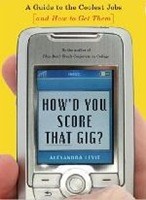One of the few things scarier than going to college is graduating from college. Once you toss that mortarboard in the air, “real life” sets in: it’s time to get a job. Or better yet, to start a career. Therein lies the rub. For most college students, not only has there been little instruction about how to start building a career, there’s also been little guidance about how to choose a career. Universities offer little in the way of self-examination with an eye towards what a student might want to do for the rest of his or her life — let alone whether he or she might actually be well-suited to it.
Levit works from the core idea that different jobs are best suited to different personality types. She outlines 7 broad character types in the book: Adventurers, Creators, Data Heads, Entrepreneurs, Investigators, Networkers, and Nurturers. What suits the detail-oriented Data Head, for example, might bore to death the fast-and-loose-playing Adventurer, while the Nurturer’s concern for others might not suit him or her to jobs that stress self-expression over attention to other people’s needs. The book opens with a simple 20-question self-assessment quiz; at the end, categories that receive the most answer “points” are likely to be the ones you’d feel most comfortable in. Many people will fall into two or more categories; others, like myself, will strongly and clearly favor just one. Each personality type has its own chapter, with around 8 or so suggested careers, each featuring interviews with people who already have “that gig” — as well as a description of the background needed, resources both on and off the Web for finding more information and getting started, and information on how to start building a career in that area.
Classify Me: What Gig Should Dustin Get?
This is a book that’s meant to be used more than read, so use it I did. After taking the assessment exam, I discovered I am “The Investigator”. Investigators place a high value on learning (ok, I’m a college professor. Check!) and excel at research (yeah, I had to do a lot of research in grad school and was top of my Master’s class. Check!). According to Levit, Investigators are “happiest when they’re using their significant brain power [her words, not mine – but really, I am super-smart…] to pursue what they deem to be a worth endeavor” and therefore prefer work that makes a difference in other’s lives — which seem borne out by my choice of a career in education rather than, you know, something that pays. Investigators aren’t fans of overly structured environments (I used to have panic attacks every Sunday night at the prospect of returning to work the next morning when I had a 9-5 job) and like to do things their own way. Finally, Levit says, Investigators are vigilant about keeping up with the latest developments in their fields — a demand well-suited to both my academic career and my other career as a Web worker. Of course, these kind of personality tests can be like horoscope signs — written broadly enough, everyone sees themselves in them. But in this case, Levit seems to be pretty close to the mark, at least so far as sussing out my personality is concerned. For further confirmation, let’s look at the kinds of careers she recommends for Investigators like me:
Antiques Dealer Art Curator Classic Car Restorer Criminologist Field Archaeologist Forensic Scientist Futurist Historian Psychology Lab Assistant
Levit isn’t trying to be exhaustive here — instead, she’s presenting readers with a set of examples of cool jobs they might be comfortable doing. That said, it’s striking how closely this list matches up to my own work and academic history. True, I don’t have much interest in classic cars or antiques. But everything else here is pretty close. I’m a trained anthropologist, which in the US encompasses human biology (which is why a lot of criminologists and forensic specialists study anthropology — and a lot of anthropologists become forensic scientists), archaeology, human culture and history, and linguistics. My particular specialty is history of anthropology, particularly the career of an anthropologist who, among other things, organized a huge futurist conference in the mid-70s. OK, how weird is all that? In short, if I had read How’d You Score That Gig? as a college student, the recommendation would have been pretty much spot-on — Levit would have told me to do basically what I’m doing today. This bodes pretty well for college-age readers looking for some kind of direction in their lives — and for other adults who might have lost their direction for one reason or another. Final verdict: This is a quite helpful guide to careers for the undecided or faltering. Keep in mind that unless you’re intensely curious, or maybe you’re a nurturer who wants to share Levit’s insight with everyone, you probably won’t be reading it straight through — this isn’t a book you have to finish to get your money’s worth! The self-assessment test is well-designed — a lot of tests like this make it clear what the answer “should” be to create a particular outcome, and Levit’s avoided most of those pitfalls. If you or someone you know is trying to figure out what to do with the rest of their life, pick up a copy of How’d You Score That Gig — you’re bound to find something you might have never thought of!

